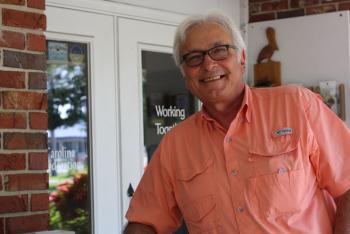Frank Tursi

1997 North Carolina Fisheries Reform Act
The Fisheries Reform Act is the most significant fisheries legislation in NC history.
In 1994, the North Carolina General Assembly approved a moratorium on the sale of new commercial fishing licenses and established the 19-member Fisheries Moratorium Steering Committee to oversee a study of the state's entire coastal fisheries management process and to recommend changes to improve that process. The Moratorium Steering Committee included legislators, fisheries managers, scientists, commercial fishermen, and recreational fishermen. The committee commissioned six research studies and reviewed a broad range of issues, including fishing licenses, fishing gear, habitat protection, agency organization, and law enforcement. The committee issued a draft report in the late summer of 1996, held 19 public meetings across the state, and adopted a final report in October 1996 that formed the basis for the Fisheries Reform Act. Governor James B. Hunt signed the Act into law on August 14, 1997.
The 1997 North Carolina Fisheries Reform Act: An Oral History Perspective was made possible by the North Carolina Sea Grant Community Collaborative Research Grant Program.
Mary Williford
Frank Tursi is a Brooklyn, New York native who grew up with a deep appreciation for the coastal environment. His early experiences fishing and exploring the local geography of Brooklyn sparked his interest in coastal issues and the environment. Tursi's family moved to North Carolina due to shifts in the garment industry. He pursued Geology studies at East Carolina University and was involved with The Fountainhead newspaper during his tenure there. Tursi later covered the Fisheries Reform Act for the Winston-Salem Journal, a process that drew him due to its significant implications for the fishing industry. He has also been involved with the coastal habitat protection plan process and has expressed concerns about the inherent failures in implementing or enforcing habitat use plans. Tursi's work is driven by his desire to protect the special coastal environment of North Carolina, which he believes is under threat.
Scope and Content Note
This interview with Frank Tursi, conducted by Barbara Garrity-Blake on May 24, 2016, provides a comprehensive look into Tursi's life, career, and his perspectives on coastal and environmental issues. The interview begins with Tursi's childhood experiences growing up on the New York coast and how these experiences influenced his interest in the environment and coastal issues. Tursi discusses his family's move to North Carolina, his studies at East Carolina University, and his tenure with The Fountainhead newspaper. The interview delves into Tursi's professional life, particularly his coverage of the Fisheries Reform Act for the Winston-Salem Journal. Tursi shares his insights on the process, key figures involved, and the implications of the Act for both recreational and commercial fishing sectors. He also discusses his involvement with the coastal habitat protection plan process and his concerns about the implementation and enforcement of habitat use plans. Tursi reflects on the changes he has witnessed in the coastal environment over his lifetime and expresses his hopes for the future of fishing in North Carolina. The interview concludes with Tursi emphasizing the importance of protecting North Carolina's coastal environment.
Please Note: The oral histories in this collection are protected by copyright and have been created for educational, research and personal use as described by the Fair Use Doctrine in the U.S. Copyright law. Please reach out Voices@noaa.gov to let us know how these interviews are being used in your research, project, exhibit, etc. The Voices staff can help provide other useful resources related to your inquiry.
The NOAA mission is to understand and predict changes in climate, weather, oceans, and coasts, to share that knowledge and information with others, and to conserve and manage coastal and marine ecosystems and resources. The Voices Oral History Archives offers public access to a wide range of accounts, including historical materials that are products of their particular times, and may contain offensive language or negative stereotypes.
Voices Oral History Archives does not verify the accuracy of materials submitted to us. The opinions expressed in the interviews are those of the interviewee only. The interviews here have been made available to the public only after the interviewer has confirmed that they have obtained consent.
